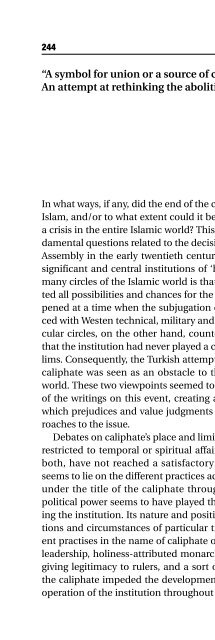Türk ve Japon ModernleÅmesi: 'Uygarlık Süreci' - Birikim
Türk ve Japon ModernleÅmesi: 'Uygarlık Süreci' - Birikim
Türk ve Japon ModernleÅmesi: 'Uygarlık Süreci' - Birikim
- No tags were found...
You also want an ePaper? Increase the reach of your titles
YUMPU automatically turns print PDFs into web optimized ePapers that Google loves.
244“A symbol for union or a source of conflict?”:An attempt at rethinking the abolition of the caliphateIn what ways, if any, did the end of the caliphate cause problems in the realm ofIslam, and/or to what extent could it be considered a reason for having createda crisis in the entire Islamic world? This article aims to rethink about these fundamentalquestions related to the decision taken by the Turkish Grand NationalAssembly in the early twentieth century regarding the fate of one of the mostsignificant and central institutions of ‘historical’ Islam. A common opinion inmany circles of the Islamic world is that the abolition of the caliphate terminatedall possibilities and chances for the unity of Muslims. In addition, this happenedat a time when the subjugation of Islam as a culture and civilisation facedwith Westen technical, military and political superiority. The modernist/secularcircles, on the other hand, counteracted this argument by underscoringthat the institution had ne<strong>ve</strong>r played a crucial binding role in the affairs of Muslims.Consequently, the Turkish attempt was right and defensible insofar as thecaliphate was seen as an obstacle to the progress of Muslims in the modernworld. These two viewpoints seemed to ha<strong>ve</strong> had a great impact on the essenceof the writings on this e<strong>ve</strong>nt, creating an unhealthy polarisation as a result ofwhich prejudices and value judgments ha<strong>ve</strong> o<strong>ve</strong>rshadowed the analytical approachesto the issue.Debates on caliphate’s place and limits in an Islamic setting, i.e., whether it isrestricted to temporal or spiritual affairs of the Muslim community, or co<strong>ve</strong>rsboth, ha<strong>ve</strong> not reached a satisfactory conclusion. The basic reason for thisseems to lie on the different practices adopted by the rulers of the Islamic worldunder the title of the caliphate throughout the history of Islam. In general,political power seems to ha<strong>ve</strong> played the main role in controlling and possessingthe institution. Its nature and position depended upon the practical conditionsand circumstances of particular times and places. In this process, differentpractises in the name of caliphate occurred, such as tribally-based politicalleadership, holiness-attributed monarchy, powerless but symbolic functionarygiving legitimacy to rulers, and a sort of papacy. These di<strong>ve</strong>rse experiences ofthe caliphate impeded the de<strong>ve</strong>lopment of some principles and norms for theoperation of the institution throughout history. The absence of such a theoreti-





